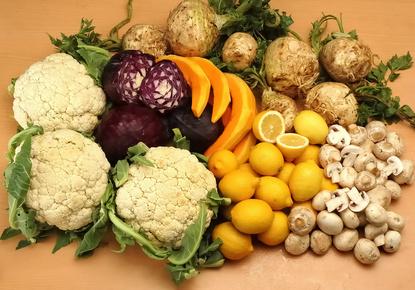Fruits and vegetables are rich in vitamins and minerals.
Fruits and vegetables provide health benefits and are important for the prevention of illnesses. The U.S. Department of Agriculture recommends filling half of your plate with fruits and vegetables at each meal. Fruits and vegetables contain a variety of nutrients including vitamins, minerals and antioxidants. Eating the recommended amount of fruits and vegetables each day can reduce the risk of chronic diseases.
Nutrients in Vegetables
Vegetables are rich in vitamin A, vitamin C, folate, fiber and potassium. Folate helps the body form red blood cells. It is especially important for women of childbearing age to consume folate-rich foods such as bell peppers, tomatoes and spinach to prevent neural-tube defects in babies. Vitamin A-rich foods such as sweet potatoes, carrots and butternut squash help keep your skin and eyes healthy and protect against infections. The USDA recommends eating 2 1/2 cups of vegetables per day.
Nutrients in Fruit

The USDA recommends consuming 2 cups of fruit per day. The healthiest choices are fresh fruits or frozen without added sweeteners. Fruit is naturally low in fat, sodium and calories, and rich in potassium, fiber, vitamin C and folate. Some high-potassium fruits include peaches, cantaloupe, honeydew, oranges and bananas. Fiber in fruit helps to protect against heart disease and lower cholesterol. Vitamin C in foods like citrus and strawberries helps with wound healing and keeps gums and teeth healthy.
Prevention of Disease

Eating produce can cut your risk of cardiovascular disease, stroke and type 2 diabetes and protect against various forms of cancer. The USDA states that fruits and vegetables high in fiber can reduce chances of developing coronary heart disease. Eating potassium-rich foods such as bananas and potatoes can help reduce blood pressure, decrease bone loss and prevent development of kidney stones. Produce also contains different phytochemicals, natural chemical compounds in plants, which maintain proper cell health.
Weight Management
Along with health benefits, eating fruits and vegetables can make weight management easier, according to the Centers of Disease Control and Prevention. Most produce is low in calories compared to other foods, so filling up on these foods can aid in weight loss or maintenance. Fruits and vegetables work as excellent substitutes in different recipes. For example, use fresh applesauce instead of oil in muffins or cookies. Add sauteed vegetables to an omelet to make it more filling without a lot of calories.
by Amanda Hernandez , Demand Media


